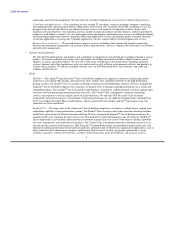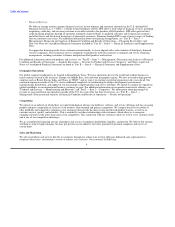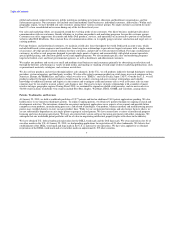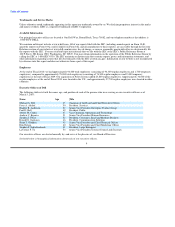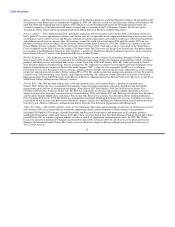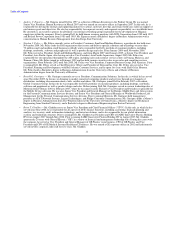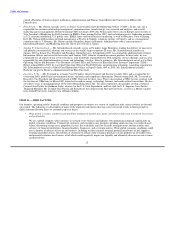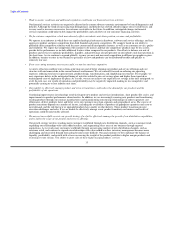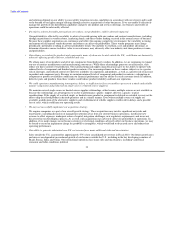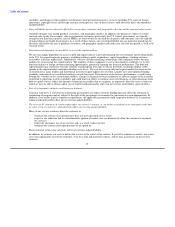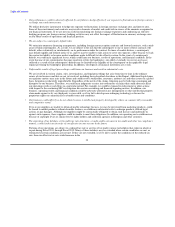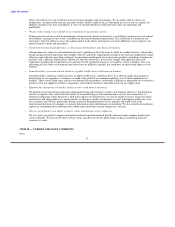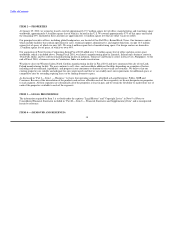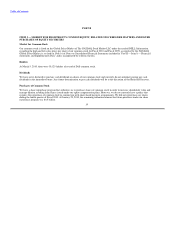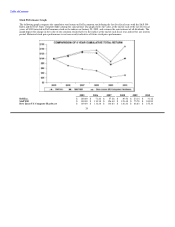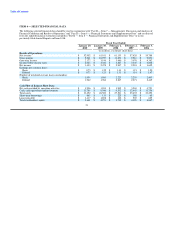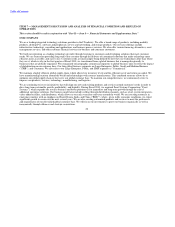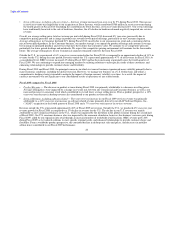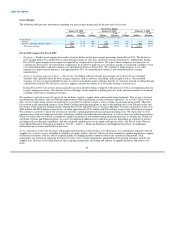Dell 2009 Annual Report Download - page 19
Download and view the complete annual report
Please find page 19 of the 2009 Dell annual report below. You can navigate through the pages in the report by either clicking on the pages listed below, or by using the keyword search tool below to find specific information within the annual report.
Table of Contents
instability, and changes in the regulatory environment, trade protection measures, tax laws (including U.S. taxes on foreign
operations), copyright levies, and foreign currency exchange rates. Any of these factors could adversely affect our operations
and profitability.
• Our profitability may be adversely affected by our product, customer, and geographic sales mix and by seasonal sales trends.
Our profit margins vary among products, customers, and geographic markets. In addition, our business is subject to certain
seasonal sales trends. For example, sales to government customers (particularly the U.S. federal government) are typically
stronger in our third fiscal quarter, sales in EMEA are often weaker in our third fiscal quarter, and consumer sales are typically
strongest during our fourth fiscal quarter. As a result of these factors, our overall profitability for any particular period may be
adversely affected by the mix of products, customers, and geographic markets reflected in our sales for that period, as well as by
seasonal trends.
• Our business is dependent on our ability to access the capital markets.
We are increasingly dependent on access to debt and capital sources to provide financing for our customers and to obtain funds
in the U.S. for general corporate purposes, including working capital, acquisitions, capital expenditures, funding customer
receivables, and share repurchases. Additionally, we have customer financing relationships with companies whose business
models rely on accessing the capital markets. The inability of these companies to access such markets could force us to self-
fund transactions or forego customer financing opportunities, potentially harming our financial performance. The debt and
capital markets may experience extreme volatility and disruption from time to time in the future, resulting in higher credit
spreads in the capital markets and higher funding costs for us. The cost of accessing debt and capital markets has increased in
recent periods as many lenders and institutional investors require higher rates of return. Lenders have also tightened lending
standards, and reduced or ceased their lending to certain borrowers. Deterioration in our business performance, a credit rating
downgrade, volatility in the securitization markets, changes in financial services regulations or adverse changes in the economy
could lead to reductions in debt availability and could limit our ability to continue asset securitizations or other financings from
debt or capital sources, reduce the amount of financing receivables that we originate, or negatively affect the costs or terms on
which we may be able to obtain capital, any of which could unfavorably affect our net revenue, profitability, and cash flows.
• Loss of government contracts could harm our business.
Contracts with the U.S. Government and foreign governments are subject to future funding that may affect the extension or
termination of programs and are subject to the right of the government to terminate for convenience or non-appropriation. In
addition, if we violate legal or regulatory requirements, the applicable government could suspend or disbar us as a contractor,
which would unfavorably affect our net revenue and profitability.
• The exercise by customers of certain rights under our services contracts, or our failure to perform as we anticipate at the time
we enter services contracts, could adversely affect our revenue and profitability.
Many of our services contracts allow the customer to:
– terminate the contract if our performance does not meet specified service levels
– request a rate reduction tied to a benchmarker's opinion of market rates (or alternatively allow the customer to terminate
the contract)
– reduce the customer's use of our services and, as a result, reduce our fees
– terminate the contract early upon payment of an agreed fee.
These customer actions may adversely affect our revenue and profitability.
In addition, we estimate our costs to deliver the services at the outset of the contract. If we fail to estimate accurately, our actual
costs may significantly exceed our estimates, even for a time and materials contract, and we may incur losses on the services
contracts.
15


